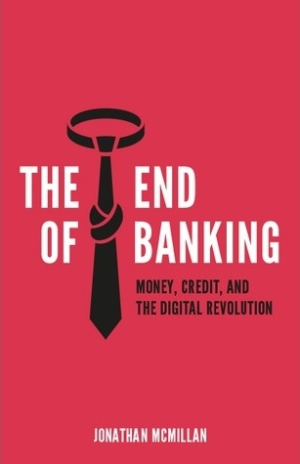The End of Banking
Money, Credit, and the Digital Revolution
This visionary book presents a bold plan for eliminating banking.
Under the pseudonym “Jonathan McMillan,” a macroeconomist and an investment banker have teamed up to craft a provocative proposal for restoring “a functional financial system” by doing away with banking. While the authors write that they intended the book for professionals in economics and finance, The End of Banking is written with enough clarity to have broader appeal.
The authors begin with an overview of the banking system in part 1 that includes financial definitions and details the mechanics of how banks function. This section is actually a helpful primer for anyone with an interest in how banks have traditionally operated for hundreds of years. Part 2 presents an exploration of banking in the digital age. Included here is a cogent discussion of the financial crisis of 2007-2008. While the authors suggest that the extraordinary policy measures put into place were necessary to prevent “a complete collapse of the financial system,” they also point out that “the large-scale bailout worsened the already dysfunctional state” of that system. It is this second part of the book that effectively lays the groundwork for the authors’ central argument; the financial crisis is the proof they cite to demonstrate that banking no longer works.
In part 3, the authors describe their plan for a financial system that removes banking from the equation. This is possible, in large part, because of the digital revolution, according to the authors. “A financial system without banking is a financial system without inside money,” they write. A financial system without banking “separates the functions of money and credit, and it sets clear boundaries between the public and the private spheres.” While some readers may view the argument presented in The End of Banking as simply a technical redefinition of banking, the authors make a compelling case for sweeping changes that do away with the inherent weaknesses they see in the current system. “Banking is out of control,” write the authors, “and instead of trying to fix it, we should prepare for the end of it.”
The End of Banking is thought provoking, bold, and visionary—and it will no doubt be regarded by some as controversial. Still, the authors offer an elegant solution, well supported by exhaustive references, that they are confident will prevent a major financial crisis from happening again.
Reviewed by
Barry Silverstein
Disclosure: This article is not an endorsement, but a review. The publisher of this book provided free copies of the book to have their book reviewed by a professional reviewer. No fee was paid by the publisher for this review. Foreword Reviews only recommends books that we love. Foreword Magazine, Inc. is disclosing this in accordance with the Federal Trade Commission’s 16 CFR, Part 255.

